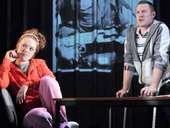SITE GUIDE
SEARCH
REVIEWS
REVIEW ARCHIVES
ADVERTISING AT CURTAINUP
FEATURES
NEWS
Etcetera and
Short Term Listings
LISTINGS
Broadway
Off-Broadway
NYC Restaurants
BOOKS and CDs
OTHER PLACES
Berkshires
London
California
New Jersey
DC
Philadelphia
Elsewhere
QUOTES
TKTS
PLAYWRIGHTS' ALBUMS
LETTERS TO EDITOR
FILM
LINKS
MISCELLANEOUS
Free Updates
Masthead
Writing for Us
A CurtainUp  London Review
London Review
 London Review
London ReviewTopless Mum
|
What would you do for this story?— Kyle
What wouldn't I do!— Annie |

Louise Kempton as Tiffany and Alistair Wilkinson as Barry
(Photo: Graham Burke) |
The play centres on Barry (Alistair Wilkinson) a soldier from a long line of soldiers, an Afghanistan and Iraq veteran who has been badly wounded and left impotent as a result of his injuries. Barry is married to Tiffany and they have a small daughter. Together they approach the newspaper with a photograph taken on a mobile phone showing a hooded, naked, dark skinned man being beaten while soldiers stand around with a dog on a lead.
A rookie reporter Annie (Emma Lowndes) is sent to get the story. The newspaper goes with the story of beatings, abuse and sexual humiliation but an army investigation by an officer, Major Kennedy (Sylvestra Le Touzel), proves that the photo was taken somewhere in the Home Counties and not in Iraq. As the newspaper staff try to invent a believable way out of this mess— think desperate soldier's wife has to bare body— the plot takes several more turns involving Tiffany's past attempt to sell toplessphotos of herself.
A final twist is put in place through interviewing another soldier Mitch (Jason Deer) who was in Iraq and who can cast light on the photograph. This plot is based on a real life con where The Mirror was fooled into buying faked photographs of British soldiers torturing Iraqis and its editor Piers Morgan, now "gracing" the judges in America's Got Talent, was sacked.
The set is dominated by a huge, ridged metal column which can take the projections and smooth scene changes rotate around this pillar. Director Caroline Hunt gets well honed performances out of her cast. I particularly liked Alistair Wilkinson as Barry who, supporting himself on crutches, walks swinging his legs forward like a spider. The introductory scenes has him introducing his photos to Annie, "That's my Mum, my dog, . . . that's well . . . (here we see the torture photo)" Barry realistically expresses his racism about the Afghanis to the journalist in the very first scene and later in the play shows his anger to Kyle about "veils and mosques and Halal meat" of his home town. Sylvestra Le Touzel as Kennedy is calm and intelligent as she investigates the actual events and exposes the story behind the photograph.
There are important speeches — one from the army short service commissioned officer Kennedy about why her job is different from that of a journalist, involving the decisions she has to take as an officer and the obedience she expects from the men, as they put their life on the line. The scene where the army major exposes the fraudulent photograph as having been taken in Kidlington, Oxfordshire to the shocked journalist is very satisfying. When Annie confronts Barry and Tiffany, Tiffany explains that they had been careful never to say that the picture was taken abroad, they had just left gaps which the eager journalist had filled in.
We also get a picture of how desperately unhappy Barry and Tiffany's marriage is since his injuries and how little support is forthcoming from the British government. "If he had fallen off a roof breaking into someone's house, they would have treated him better." she says.
Kyle (Giles Fagan) the editor of the tabloid makes a speech about the contempt he has for the British soldier, "We can ship his shell suited, pimpled arse abroad. . . " and have been doing so for more than 200 years. Black soldier Mitch (Jason Deer) describes an Islamic religious festival where everyone wears white with his sense of wanting to belong, "they had the answer" he says admiring the certainty of their value system. Barry too wanted that sense of belonging when he joined the army and this gives us an example of what motivates young men to join up.
While the play makes serious points about the kind of men who are employed as soldiers, and the lack of ethics of the press, Ron Hutchinson's play also has lighter, comic moments which make it enjoyable and stimulating.
|
Topless Mum
Written by Ron Hutchinson Directed by Caroline Hunt Starring: Sylvestra Le Touzel With: Alistair Wilkinson, Emma Lowndes, Louise Kempton, Giles Fagan, Jason Deer Design: Conor Murphy Video: Jack Phelan Lighting: Mark Howland Sound: John O'Hara Tobacco Factory and Imagineer Productions in association with The Tricycle Running time: Two hours with one interval Booking to 28th June 2008 Reviewed by Lizzie Loveridge based on 2nd June 2008 performance at The Tricycle, Kilburn High Road, London NW6 (Tube: Kilburn) and at The Playhouse Oxford Box Office 01865 305305 July 15th - 19th 2008 Box Office: 020 7328 1000 |
|
REVIEW FEEDBACK Highlight one of the responses below and click "copy" or"CTRL+C"
Paste the highlighted text into the subject line (CTRL+ V): Feel free to add detailed comments in the body of the email and state if you'd like your comments published in our letters section. |
|
London Theatre Tickets Lion King Tickets Billy Elliot Tickets Mighty Boosh Tickets Mamma Mia Tickets We Will Rock You Tickets Theatre Tickets |




